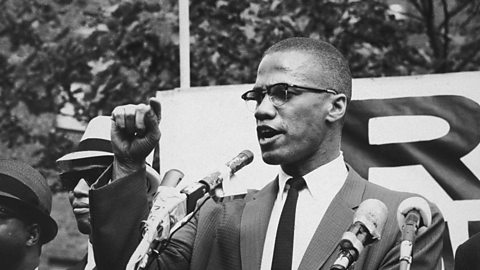Black nationalism, Malcolm X and the Nation of Islam
Explore civil rights and the origins of Black Power through animation and archive footage.
Black nationalism
In the 1960s, some black Americans started to become frustrated with the slow pace of change. Many white Americans were only gradually being persuaded to let black Americans have more freedom from discriminationTo treat someone differently or unfairly because they belong to a particular group. This led to growing support for a movement known as black nationalism. This was the idea that black Americans could not trust white Americans to solve all of their problems and that they would only be free if they lived separate lives from white Americans.
The Nation of Islam
One such group black nationalist group was the Nation of Islam â a religious and political organisation. The Nation of Islam argued that equality for black Americans could only be achieved by black and white Americans living in separate states. Many people, including other black Americans who supported the civil rights movement, saw the Nation of Islam as hating white people. The group initially had very few members when it was founded in the 1930s, but by 1962 there were around 40,000 members, including champion boxer Muhammad Ali.
Some features of the Nation of Islam were:
- a belief that black people should be proud of their race and all work together
- the view that white people were âdevilsâ
- a desire to set up their own separate black nation
- readiness to use violence to defend black people against white oppression
Malcolm X and the Nation of Islam

Malcolm Little changed his name to Malcolm X when he became a member of the Nation of Islam. He rejected the surname that had been given to his family by the people that had enslaved them.
He converted to the Nation of Islam while he was in prison for burglary. When he left prison in 1952, he formally changed his name and travelled across America spreading the message of the Nation of Islam.
Like Dr Martin Luther King Jnr, Malcolm X became well known for his passionate speeches. However, he was critical of the methods used by King and his followers. He said Kingâs supporters were wasting their time trying to win over white Americans. He described the March on Washington as the âfarce on Washingtonâ. Another contrast to King was that Malcom X was prepared to say that violence might be necessary to achieve freedom for black Americans, but only in self-defence.
We want freedom by any means necessary. We want justice by any means necessary. We want equality by any means necessary.
The civil rights movement was mostly focused on the southern states. In contrast, Malcolm X concentrated his efforts on urban black American communities in the northern states, such as New York. He worked to set up education schemes for young black Americans, who made up the majority of the members of the Nation of Islam. During this period of his life, Malcolm X helped young black Americans to reconnect with their African heritage. Many of these young people would go on to be part of the Black PowerA movement in support of rights and political power for black people. movement.
Malcolm X after he left the Nation of Islam
Malcolm X left the Nation of Islam in 1964 after the leadership of the organisation refused to allow him to collaborate with other civil rightsRights everyone is entitled to regardless of the colour of their skin, their beliefs, sexuality, gender or other personal characteristics. These rights could include the right to vote, or the right to a good education etc. campaigners. On 26 March 1964, Malcolm X joined Martin Luther King in Washington, DC, to support the creation of the Civil Rights Act.
To understand more about being a Muslim, he went on a pilgrimage, the HajjThe pilgrimage Muslims make to Makkah (Mecca) during the twelfth month of the Islamic calendar. The Hajj is the fifth and final pillar of Islam. to Makkah (Mecca)City where the Prophet Muhammad was born, and where the Kaâbah is located - often spelt Mecca. Shortly after, Malcolm Xâs wife received death threats over the phone and his home was firebombed. Malcolm X suspected that this was the Nation of Islamâs response to him leaving. On 21 February 1965, Malcom X was shot dead while he was giving a speech in New York.
Malcom X focused on solving the problems that were caused by poverty among black Americans. He also showed black Americans that they should be proud of who they were. This was an important influence on the Black Power movement later in the 1960s.
More guides on this topic
- Anti-Communism c.1945-1954 - OCR A
- African Americans c.1945-1954 - OCR A
- Civil rights in the USA 1954-1964 - OCR A
- Broadening of the campaigns for civil rights - Women's rights - OCR A
- Broadening of the campaigns for civil rights - Gay rights - OCR A
- Politics and protest - OCR A
- Social problems and attempts to tackle them - OCR A